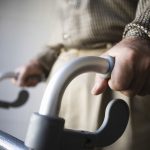Parkinson’s Disease: The Hidden Symptoms
Most people are aware of at least some of the “symptoms” of Parkinson’s disease including
- Tremor at rest
- Muscle Rigidity
- Gait and Balance Problems including small steps and freezing in place
- Bradykinesia or slow movements
The symptoms listed above are the motor symptoms of Parkinson’s Disease and are frequently noticed by both the patient and family.
However, there are other non-motor symptoms that can be equally distressing including
- Craniofacial features such as masked or expressionless facial features, drooling, anosmia or loss of smell, hypophonia or weak voice, dysarthria or trouble coordinating the muscles used to speak, and dysphagia or difficulty swallowing
- Sensory features including parasthesia or numbness and pain
- Autonomic features such as urinary retention and/or incontinence, constipation, sexual dysfuntion
- Neuropsychiatric features including depression, anxiety, apathy, dementia, and psychosis
- Others such as fatigue, sleep disturbance, loss of blink reflex, and dry skin
Parkinson’s Disease typically presents between ages 60-70 but can occur much sooner. Also, medications such as metoclopramide (Reglan), prochlorperazine (Compazine), risperidone (Risperdal), and olanzapine (Zyprexa) can also cause Parkinson-like symptoms. This is known as secondary Parkinsonism and often the symptoms will resolve when the (secondary) cause is removed.
Treatment of Parkinson’s Disease typically focus on symptom management.
Dementia – 80% of Parkinson’s Disease patients will develop dementia. Drugs used to treat the motor symptoms of the disease may actually worsen the dementia by causing delirium or increased confusion. Often the treatment is to find a balance between control of the motor symptoms and limiting these side effects
Psychosis – nearly half of all Parkinson’s patients will have episodes or psychosis. Again, reducing the dose of drugs used to treat the motor symptoms will often resolve the psychosis. Antipsychotic drugs such as haloperidol (Haldol) and risperidone (Risperdal) should be avoided. The only antipsychotic drug that may be used in low doses is quetiapine (Seroquel)
Mood Disturbances – depression and anxiety are common in Parkinson’s disease and may significantly reduce the quality of life for both patients and caregivers. Treatment with antidepressants is often needed for an extended duration (late-life depression)
Source: Fernandez HH. Updates in the Medical Management of Parkinson Disease. Clev ClinicJ Med Jan. 2012:79(1):28-35.




